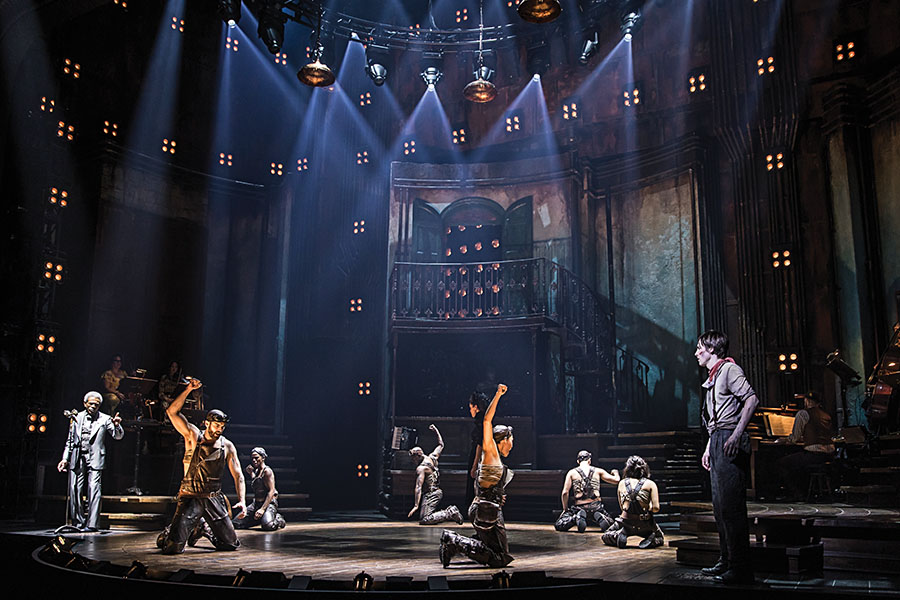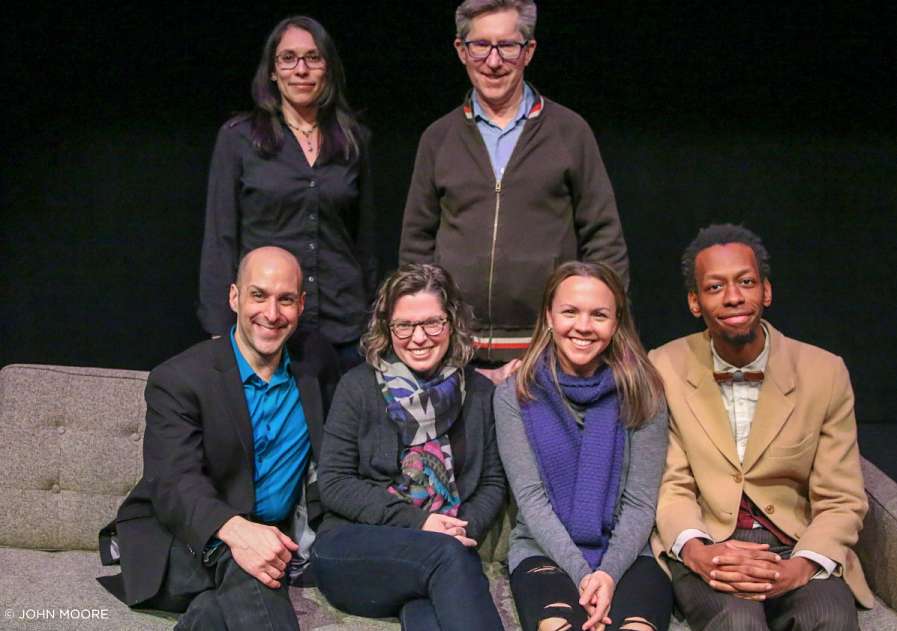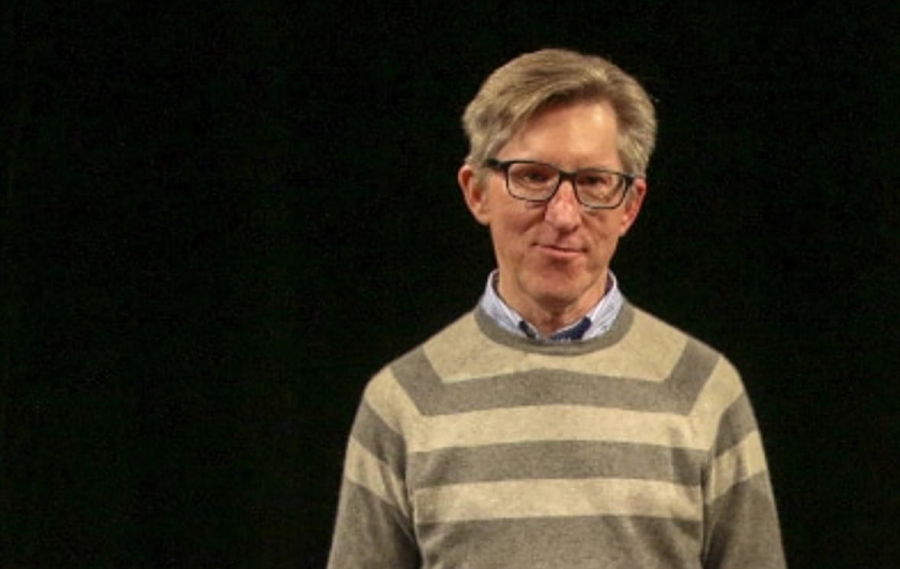Doug Langworthy, a dramaturg and translator who served as director of new-play development at Denver Center Theatre Company, died last March.
What is an ending? When we are left with the final uttered words of a dramatic work or the closing of the curtain, we are likely holding strong emotions. Maybe a knowing nod. Mm. Perhaps tears of sadness. Sniff. Or maybe even side-splitting laughter. Haha!
Regardless of the emotion, the enrapturing arc of story moves us. It stays with us. We lovingly (or begrudgingly) let go of one narrative world in order to be able to enter into another at some future time. Perhaps we may revisit the world that moved us so deeply, looking for elements that we didn’t notice—new ways to be enraptured. But there is always solace in knowing that when we reach the point of finality in our story, it’s not the final chapter in our story. The ending of a story means that life goes on.
For me, in a time away from time, I didn’t realize that it was the end for him and me. When we sat there under the stars, I tried to absorb all of the wisdom that I could from him. All of the story that had led us to that moment. I didn’t know it would be the last time.
❦
It was just a few weeks before Spring of 2020. I was in New York City for a fever dream of a 36 hours, and I did what one does when in the Concrete Jungle: I went and I saw. I looked for beginnings and endings.
The show that moved me most had no ordinary beginning, and hardly an ordinary ending. It was a piece of theatre I had been really excited to see for a long time: Hadestown. With its folk-infused, New Orleans-reminiscent score, I felt the buzzing cabaret energy the moment I walked in. And like many a musical theatre nerd, I had lyrics locked and loaded in the chamber of my tongue, ready to quietly unleash years of training for this moment.
The show is based on the classic myth of Orpheus and Eurydice. Orpheus—the son of eloquence incarnate, Calliope, the muse of poetry—has inherited his mother’s heavenly artistry. He is the greatest bard to have ever walked the Earth. His songs are so sensuous, so moving, that even the trees and stones bend to his will. His very presence makes the flowers grow. Yet at the outset of Hadestown, the narrator Hermes, played by the forceful André De Shields, reminds us of the nature of this tale: It’s a tragedy. In the original myth, Orpheus loses his wife and only love to the one force that can’t be conquered: death. Orpheus’s heart is torn asunder by his loss, and for his love, he sings a lament so heart-wrenching that the heavens shake and the gods themselves importune him to retrieve her soul.

So he goes down into the depths of hell—the eponymous Hades—to retrieve Eurydice. When he gets to the innermost depths of the world below, his song even moves the god of dust and bone himself to tears. Hades agrees to let Orpheus walk out of hell with his wife…on one condition. He is not allowed to look at her until they reach the light of the Earth. Orpheus agrees. He makes the long walk out of hell. But as he stands at the barrier of the mortal realm, he has a thought. What if Hades tricked me? What if I never see my love again? And just as Orpheus is about to step onto the solid ground of Earth, he looks back, just once, to confirm that his love is behind him. She is. And before he can react, she is whisked away, back into the depths of hell, never to be seen again.
Anaïs Mitchell renders the story in a manner both raw and gripping, in a way that begs to be savored. But there’s something so emotionally painful about the myth: There is no true ending, no sense of completion. Orpheus loses Eurydice and simply wanders the Earth in madness. There is no drinking poison. No duel. No throwing himself upon the blade. Just wandering. Endlessly.
I can relate to Orpheus. He is a man who was just trying to add beauty to the world. Perhaps I like him so much because I understand the feeling of walking through the dark. And I’ve always been passionate about telling the tales of those who do the same.
❦
A few years ago, I came to find a man who shared that passion: Doug Langworthy. With his wisp of white hair and calm, sympathetic demeanor, he was the quiet storm at the Denver Center for the Performing Arts. The head of the literary department who fiercely brought new work onto the mainstage, he would have been the kind of person to calm Anaïs Mitchell on the days when her show’s nearly 15-year journey to Broadway might have caused her to pack up and turn around—to look back before she saw the promised land.
I had such respect for him. I had seen him lead so many projects that captured the imagination and pulled the heart. He would come to usher in some of my favorite projects for the American stage. Everyone loved him. And I knew I needed to find a way to work with him.
I had interacted with Doug on several occasions over the years and he was always very kind to me. I knew the profound effect he had on many of my colleagues; he was a kind, avuncular figure who was always waiting to watch you give it your all.
Our paths would formally intersect when I started on the journey of creating a piece about another man trying to lead his people out of the darkness: Patrice Lumumba. Lumumba’s story was the most well known in the world a mere half-century ago, but has since been all but forgotten. My parents came to the United States as immigrants from Congo, so his harrowing tale has been infused into my blood.
At the beginning of the writing process, I sat down with my mother and spoke to her about my great-great-great-grandfather, Simon Kimbangu, a man who started a new religious movement in Congo that is now followed by 25 million people. He led the resistance against Belgium and was thought to be a prophet. And prophesy he did. She told me, “Papa Simon Kimbangu met Patrice Lumumba when he was a boy. He told Lumumba that one day he would lead the nation. But,” she added, “he also spoke to a young boy named Joseph Mobutu, who was around the same age. He also told Mobutu that he would lead the nation.”
These two men, destined to be brothers. Destined to free their land from the bonds of colonialism. And destined to be their own undoing. How would that end? That was my challenge. And it was rendered even greater by wanting to add music to the endeavor.
To my honor and delight, I got my opportunity to work with Doug and his team. I was announced as an inaugural playwright for a new writers’ development group, the Playwrights’ Group, that the Denver Center had launched. Unsurprisingly, it was Doug’s brainchild, alongside his close colleague Lynde Rosario. They were interested in my piece. They were interested in me. But one question dogged me the whole time: How do I create a satisfying ending?

I worked closely with Doug for nearly a year. He encouraged me and pulled the best out of me as a storyteller. He approached the subject matter of my piece with curiosity and specificity. He always pointed out the particular lines he loved in my songs or the specific moments that caused him to question why I made a certain choice. I felt more empowered than I ever had.
A few days after I returned from New York and Hadestown, our group had a late-night meeting that was both illuminating and challenging. Doug listened to my thoughts attentively as always. And at the end, I nervously announced that after a buildup of nearly 10 months and several public readings, it was finally time to share the ending of my play at the next meeting. I smiled, looked around the room, and breathed a sigh of relief. A breath of resolution.
After the meeting, Doug offered to give me a ride home, which I obliged. During that ride, we took a narrative jaunt around our passions in the dramatic world. Doug told me about his love of German translation and the works that were fascinating him. I told him about my trip to New York and the musicals that were exciting me, including Cambodian Rock Band. We discussed the Colorado New Play Summit, which had just occurred the week prior—a beautiful event he curated for years. I shared that the one thing I would have changed at the summit would be to increase the chances for all of the stage professionals gathered there to connect in a deep way. “This business is hard work, forged from hard lives that ask a lot of us,” I said. “So many of us are fighting invisible battles.”
He nodded and softly thanked me for my input. As neon signs and old Victorian homes whirred by, he told me about being enthralled with theatre in London. That’s where he had seen Hadestown. We swapped notes on the work, which we both found enthralling. We talked about the importance of bold creativity, diverse storytelling, and empowering those whose perspectives need a light shone on them. We pulled up to my house and continued to sit in the car as minutes blurred into an amaranthine space—a sacred space of time away from time that only these kinds of situations can create. One where you’re sharing your hopes and dreams, even if neither is ever directly uttered. He told me he was excited for the ending of my play. I knew I would hold onto this conversation for a long time.
❦
A few days later, I had several missed calls from my colleague Jeff Neuman, a fellow playwright in our cohort. It was very early in the morning, so the urgency seemed out of place. I called him, unsure what was going on, hoping that he had not found himself in some kind of emergency.
As he picked up the phone, in his characteristically generous way, he thanked me for returning his call.
“I wanted to tell you this before you heard it from anyone else.”
There was a long pause as his voice started to break.
“It’s Doug. He’s dead.”
Another break as I felt the room spinning around me.
“He committed suicide.”
I was sad. I was sick. I was twisted. I was nauseated.
Jeff was a longtime friend of Doug’s, and I learned that Doug had been fighting an invisible battle for a long time. The painful dread of a mind twisting and folding upon itself. Of a person lost in the darkness. It was a battle you would have scarcely guessed from interacting with him. And the battle had become too much for him.
It’s strange that the last thing we talked about was Hadestown. There’s a set of lyrics from the musical that has stuck in my mind ever since I first heard them, spinning, shifting, and transmogrifying in meaning every time they play aloud.
The meanest dog you’ll ever meet
He ain’t the hound dog in the street
He bears some teeth and tears some skin
But brother that’s the worst of him
The dog you really gotta dread
Is the one that howls inside your head
It’s him who’s howling drives men mad
And a mind to its undoing
In that week those words shattered me.
❦
It’s strange that the last thing that he and I talked about was Hadestown. Here you have Orpheus, literally walking out of hell, and everyone who loves him is right behind him, cheering him on and reminding him that he is not alone as he walks through the darkness. But the thing is…he can’t hear them. He couldn’t hear them. So he loses himself.
It was in that car conversation that I learned about the work Doug did to bring Lynn Nottage’s Ruined to Denver. That he’d taken several trips to Uganda, and organized meetings with dozens of Congolese women to talk about their experiences of the atrocities of Eastern Congo. I Iearned even more of his fierce determination, masked by a quiet demeanor. It was a burning desire to elevate the unheard.
The day after the phone call, I was standing in an audition meeting in front of David Byrne and the team putting together his world premiere Theater of the Mind immersive project. Doug had been one of the project’s creative linchpins. As I stood in the room, all I felt was a void—a stillness asking me to call forth lines in front of all of his colleagues who had worked with him for countless years and a cumulative set of decades, all trying to make the show go on. It was so strange. And all I could do before speaking my lines was to talk about him.
In the week just before his death, Doug was the dramaturg for the summit reading of Reclaiming One Star, a play by Suzan Shown Harjo and Mary Kathryn Nagle about the 60-year struggle to get Washington’s NFL franchise to change a team name based on exploitation and written in blood. Just a mere few months after that fateful day, in response to the ardent calls for racial equity that swept the country last summer, the once unthinkable actually happened: The team changed its decades-established name. Doug’s final theatrical act was an honoring of those who have been overlooked longer than perhaps anyone else: the Indigenous communities who have stewarded this land from the beginning.
Doug Langworthy was a man who meant a lot to the theatre, both in the U.S. and around the world. As hundreds of people poured in from all around the nation to honor him at a long-anticipated hybrid service, his longtime friend, theatre journalist John Moore, reminded everyone just how remarkable this man was. He penned a beautiful eulogy read by six theatre professionals, including myself. I heard things that I cherished and I learned things that I never knew. John wrote about Doug’s work translating Faust; his pivotal role in the infamous Play On initiative; his selection as Oregon Shakespeare Festival’s first full-time dramaturg; his time at the McCarter Theatre; and the profound influence he had on dramatic translation.
But what moved me the most was the legion of theatre professionals, both burgeoning and established, who showed up to honor a beautiful soul that had guided so many on a path of learning how to share their unique light. As John wrote, “Doug liked to call himself ‘a card-carrying Libra, ever seeking harmony in the world.’ ” All were there to honor the story of one person who always put others’ stories first.
John also highlighted that away from the stage, Doug was happily married to Rex Fuller, CEO of the Center on Colfax in Denver, a building I lived around the corner from for a long time—a brave space dedicated to fostering empowerment, enrichment, and advocacy for Colorado’s LGBTQ+ community. Both dedicated to uplifting community, Doug and Rex first dated on Sept. 4, 2008, married on Sept. 4, 2011, and made it legal on Sept. 4, 2015.
I felt a kinship toward Doug, like he understood a piece of me and my home that a lot of people don’t get to touch. There’s an energy inside me that influences the way I see the world, invisibly, imperceptibly. He seemed to understand that energy.
❦
That night in the car, I told him I was scared. I didn’t have a nice, happy ending for my show. I mused that some people find it difficult or even disappointing that Hadestown has a sad ending. As I rubbed my hands together, throwing thoughts into the ether of that space, I wanted to tell him that I hadn’t just gone to New York to see a few shows; I was also a finalist for selective national residency. But I didn’t want to divulge the information until I knew whether or not I’d actually gotten in. My reticence now seems so trivial given what must have been brewing in his mind at the same time.
He would never get to see the end of the story. Life did not go on for him. And there’s a wound in my spirit that aches every time I think about that. It’s the feeling of wanting to share something so precious with a mentor, guardian, or teacher—someone who really believes in you. That feeling of just wanting to say: “I made this.” And waiting for them to say: “I’m proud of you.”
I found my ending. And Doug, you gave me the courage to do so.
We’re still walking behind you, cheering you on as you find your way into the light. Your peaceful ending. Just like Orpheus, the world is more beautiful because you were in it. Your presence made our flowers bloom.
As I got out of the car, the last thing you said to me, without missing a beat, in your calm, quiet-natured way, was, “I think sad stories are worth telling.” I smiled.
I agree.
Brenton Weyi (he/him) is a writer, thinker, and polymath. His musical My Country, My Country tells the intertwining stories of Congolese independence leader Patrice Lumumba and King Baudouin of Belgium.


